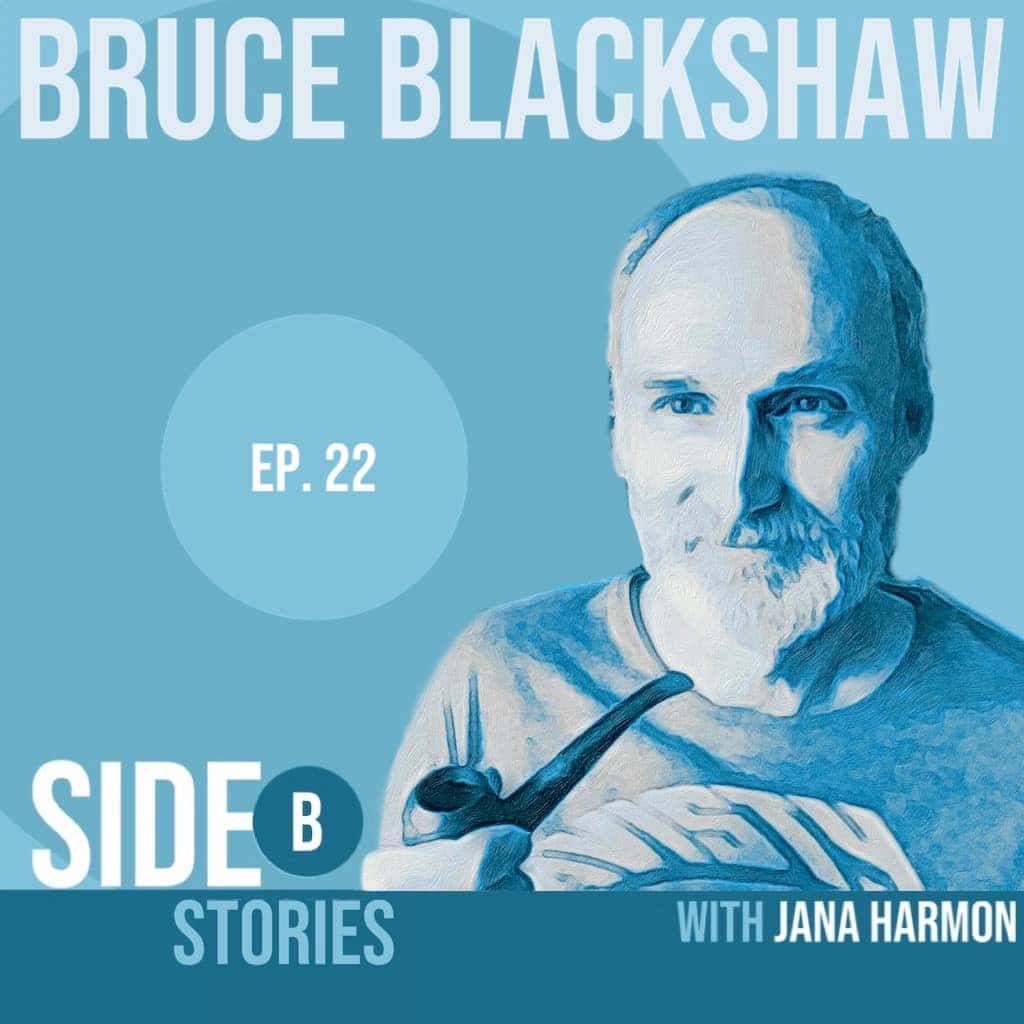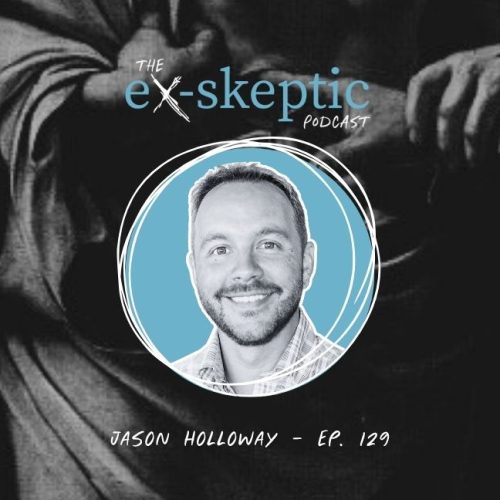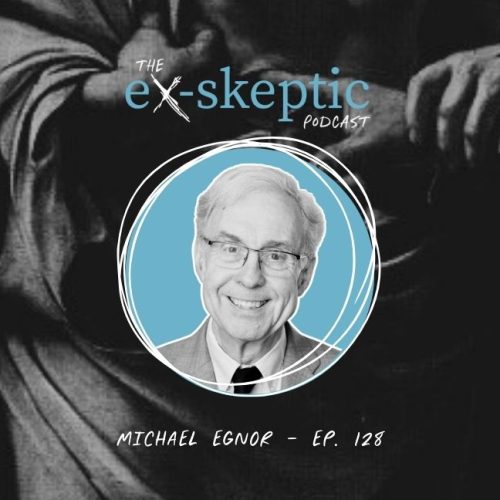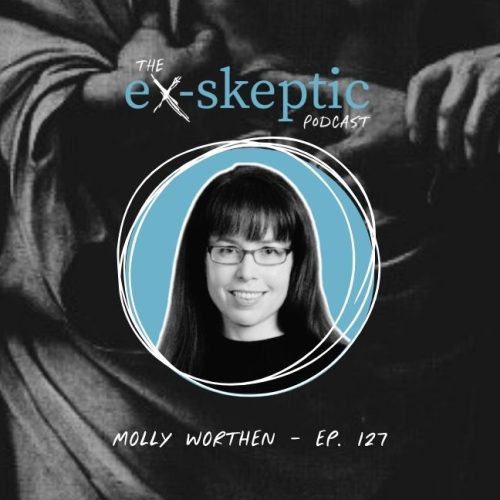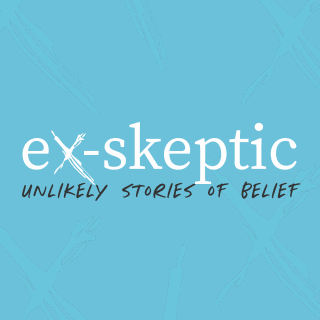
Can the thinking person believe in God? In today’s episode Bruce tells his story of moving from atheism as informed by science to a rational Christian faith that informs both science as well as the most profound questions of life.
You can find out more about Bruce through his blog Philosophical Apologist at https://philosophicalapologist.com
Episode Transcript
Welcome to the podcast, Bruce. It’s so great to have you on the show!
Thank you for having me.
As we’re getting started, I’d like to get to know you a little bit. Why don’t you tell us a bit about yourself, your background. I know you have quite an impressive academic background. Why don’t we start there?
Okay. Your listeners will probably think, “Wow! This is someone who’s just spent far too much time at university.” To start with, out of high school, one of I guess my first loves, as it were, was mathematics, so out of high school, I did a degree in mathematics and physics and became a high school teacher and taught in high school for a few years, mainly mathematics and physics. This is in Australia. After probably about four or five years of that, I got I guess a little bit bored of teaching the same thing, and I was always interested in computing, so part time, I went back to university and started a degree in computer science and eventually, after a year or so, I grew to like that quite a lot and quit my teaching job and spent a year full time finishing off that computing degree and then got a job in a research center at a university doing programming work. So that was, I guess, the start of my career in computing, which I’ve been doing for many, many years now.
I worked for a few years in that, and I was working in another research group in a large private computer company in Brisbane, Australia, and I got the idea of doing a master’s degree by research, so I spent the next year and a half doing a master’s degree in computer science, kind of combining some of the research work I was doing for the company with research for the master’s, and so I did that for a couple of years. Finished that off. Had a long stretch of over a decade without any formal study. Got a bit, sort of itchy feet again, so, “What am I going to study?” And I was always interested, having been a Christian for quite a long time by that point, I was interested in Christian apologetics and had done a lot of reading in that area.
Eventually, I came to the conclusion that, to be a good Christian apologist, to defend the faith as an apologist, I needed to understand philosophy better, and so, for me, that meant going back to university and doing a degree in philosophy. Which I did from the University of London. I was in Australia at the time, but University of London has a great international program, where you can do degrees by distance, and so I spent five years in total doing my bachelor of arts degree in philosophy through the University of London, Birkbeck, which I really enjoyed. And towards the end of that, I started thinking, “Well, what am I going to do with this?” and I’d met a friend who’s been interviewed on this podcast before, Daniel Rodger his name is, and we’d done a lot of talking about bioethics, and I think he and another friend convinced me that I should go on to do a PhD in bioethics. And that’s what I’m doing now. I’m probably in the last third of my PhD, and that’s at the University of Birmingham in the UK.
Wonderful school. My alma mater.
Oh is it? Really?
Yes, yes. That’s where I received my PhD.
Oh, okay. Yeah.
Yeah, yeah.
I’ve been on campus. I’m doing that by distance as well. I’m in Australia right now, but I actually started while I was living in London, and I have been to the university campus a number of times now, and it’s a great spot. I really like it there.
Well, good, good. You’re in good company with William Lane Craig.
Yeah. That’s right. He did his PhD there as well.
Right. In philosophy.
Or one of his PhDs.
Exactly. You’re right about that. So you’re obviously extremely well studied and continue to have obviously an active mind and pursuing really rich and deep truths. Particularly, I’ve noticed that you have quite a resume of academic publications in the area of bioethics, so even though you’re actively in a PhD program, you have published prolifically in that area. I would say quite impressive. So it sounds like you have… You’re currently in Australia, right?
That’s right. Yeah. I moved here in December last year from the United Kingdom, where I spent the previous six years.
And that is your home, so why don’t we kind of take your life now back towards the beginning? Because we want to understand what your thinking was earlier in your life. Did you grow up in Australia?
I did. I was born in Brisbane in Australia and mainly grew up in Australia. Interestingly, though, one of the big influences on my life was actually in the United States. My parents were both atheists or agnostics. They don’t really have any belief in God at all. They’re both scientists. My mother, when I was a child, in primary school, she did a PhD in animal behavior and became a lecturer in animal behavior and quite a well-known one. My father was a physiologist, and he studied reproduction, and he worked for many, many years at the University of Queensland in Brisbane, so I come from quite an academic background, and it’s kind of been a natural thing to go on and do more study myself, just because of the example of my parents. My grandfather was also an academic as well, so yeah, there’s quite a long line in my family from that regard.
But my parents didn’t have any belief in God, and growing up, I didn’t either. I naturally took the sort of view that if you can’t prove it with science then it’s not really worth anything. And I guess one of my earlier memories in that regard was… My dad spent a sabbatical year in St. Louis, Missouri, in the United States. He was at Washington University there. And I can remember I started a year of school in St. Louis, Missouri, at a school called Brentwood, in a place called Brentwood in St. Louis. And I can remember in the classroom the teacher asking who believed in God and who didn’t, and I was the only person in the class who didn’t believe in God, and they asked me what I believe, and I said, “I believe in science,” so that’s one of my very sort of earlier memories of not being a believer.
The culture that you grew up in as well, beyond your family… Was there any reference to Christianity in your culture or among your friends? Or was it-
No. Australia is not like the United States. I guess people worship the weather and sport and things like that, so I didn’t set foot in a church in Australia until I was a teenager. I didn’t go to Sunday school. I didn’t do anything in that regard. It was quite easy when I grew up to completely avoid church altogether. It wasn’t something that ever even occurred to me to do or anyone I knew would… No one I knew would go to church. So no.
It just wasn’t on the radar.
It wasn’t on the radar. And that’s fairly normal for a lot of people in Australia, I think.
So, during this time, it just wasn’t a thought for you. It was totally irrelevant. What did you think God and religion and religious people… what was that for you? What did you think it was?
It wasn’t really anything at all. I guess unusually I grew up without a television set. My parents were keen on kids wasting their time watching TV, so I didn’t get a television set in the house until I was about 16, so I did a lot of reading, but I was a little bit ignorant in other ways. Any of the more popular TV shows, I didn’t know anything about them. I didn’t really have any, or very little, thoughts about God whatsoever. Probably the only thought I remember as I was a young boy was wondering what happened when I died and thinking of the world without me in it, and I think I found that a bit of a disturbing thought, that I would die and the world would go on as if I’d never existed and no one would really care too much. So that was probably the only thought I remember on those kind of lines.
So, as you’re moving along, you found yourself at church one day. It seems like there’s a pathway from not thinking about it at all to being in a church building. What happened between those two things?
Well, when I was living in the United States for my dad’s sabbatical year, in the summer holidays, just to keep the kids busy, mom and dad packed us off to a vacation Bible school for a week. And that was my first time I had ever read the Bible, had it taught, and there was something about it that really rang true to me, and I think, from that point… I guess maybe I wasn’t a believer, but from that point, something really resonated with me, and I thought, “This really feels as though it’s kind of true,” and I was pretty young then, but I think in some way, looking back, I think God had His hand on me from that point in particular. Something changed at that point, and when I came back to Australia, I didn’t have any capacity to do anything about it. I didn’t even think about it.
But it was a couple of years later, maybe three or four years later, when I started high school, I ended up going… There was a Christian group at school which I got drawn to, I think, a little, but my brother ended up going along to a youth group on Friday nights at a church, and when I got to high school age, I was eligible to go as well, and so, not having much better to do, because there wasn’t really too much to entertain myself with in Brisbane in those days, I went along to youth group on Friday nights. And that was run by a church in Brisbane.
I’m curious what your parents thought about that at that time. Obviously, you were a high schooler and a teenager, but knowing that… I guess if you worshiped science in a sense, or your family did, or that was the way of thinking at the time for your family, were they taken aback? Or disconcerted in any way for you going to something like this?
No, they weren’t. No. They were quite happy for me to go along. I think they… In their view, it would probably keep me out of trouble as a teenager. And I had a sister who got into a little bit of trouble during those years, the teenage years, and so… yeah. I think they just thought it was a fairly safe place for me to be.
I guess safe in some regards, perhaps not in others, in terms of the way that they were thinking. What were you hearing? Or was there something that was drawing you in even as you were at this youth group?
I think… As far as the youth group was concerned… I mean, God had His hand on me in a way that I look back and see now, but at the time, it was the most interesting thing going on my life. The guys that were running the youth group were very outdoorsy types, so we would do interesting activities. We would have what they called car rallies, where we’d race around in cars, and we would do rock climbing. We would go on hikes. And the guys who ran that youth group took a real personal interest in the kids that they were looking after. And it wasn’t just the youth group that they ran. They kind of involved a lot of the kids in their lives in other ways as well, so when they went out and did something like go on a hike on a weekend, they would invite us along with them, and so… yeah, we had some really important Christian role models from that point of view who became my friends.
So you were developing some meaningful relationships. It was more than just merely a social activity that you attended. you were developing a sense of community and friendships with some people, I guess, that you, like you say, respected in a way, that they were role models.
That’s exactly right.
That is a really beautiful way, I guess, to show Christianity, in addition to just telling you about it. So what was it about them or their lives that was attractive in a sense, that was something different or other than perhaps what you had experienced outside the Christian community?
They were nice guys who really cared, who really, really invested some of their life in the kids in the youth group, including myself. And, even today, that’s not that common a thing, I think.
Yeah. We are in such a culture of isolation at the moment, especially with COVID, but yeah, that is something quite wonderful in terms of investing in the other and feeling known and belonging. But I know, again, as a thinking person, that satisfies some kind of existential need in us, that need to know and be known and to belong, and that’s very attractive. What else were you learning about Christianity that was drawing you more towards that?
I think I was doing a bit of catch-up in a way. I knew very little about the Bible, didn’t really know the Bible stories or anything like that, and so there was quite a long period there I was just becoming familiar with what was between the covers of the Bible, reading it and being taught it. And I think part of that was people I respected believed it. They lived it. They were very consistent in their Christian faith, and so I could see it at work in their life, and I think, over time, I began to think, “Well, this is probably for me as well.”
So what were you finding in the Bible that rang true for you? What was it that was making sense, that you felt like it was something that you wanted to adopt in your life? Was it just the moral principle? Was it something deeper, more spiritual than that?
I think it grew into something more spiritual as the years went on. During my teenage years. And I began to see that I could make sense of the world through the story that it was telling, that I could understand now why we were here, that when I died there was actually meaningful life after death as well, and yeah… all the pieces started to fit together in a way, particularly for the questions that I could see science couldn’t answer.
It’s often said that science and belief in God are irreconcilable, but obviously you’re a scientist and a Christian, and how were you, at this point in your life, reconciling those two things?
Well, I should correct that you that I’m not actually what I’d call a scientist. I did a bachelor of science degree, that’s all. If anything, I’m a philosopher and a software developer, not a scientist, but having grown up with scientists and had a lot to do with science, I guess I do understand the scientific mindset a little. I don’t see any necessary conflict between the two at all. I mean, science is a tool for investigating our world. It operates by certain rules, and using those rules means we discover the natural laws that govern our planet, and we can learn a lot about the life on our planet, but I don’t see that there’s any inherent conflict between science and faith.
So that was not as an issue as you were embracing this religious understanding of the world, that it was making sense for you and it was answering some big questions, but they were different kinds of questions than perhaps the mechanics and the how, as compared to the why.
Yeah, that’s right. One of the leaders of our youth group was studying science at university and doing an honors project, a research project which I helped him quite a bit in. It was to do with the introduction of exotic fish into local waterways, and I spent a lot of time traipsing around with him, helping him catch fish and things like that, and… Yeah, I couldn’t see any conflict between what I was learning about the Bible and faith with what he was doing as an early budding scientist.
And as you were reading more about the Bible and Jesus and what the Bible was saying was ringing true. It was making sense of your life and of the world in the way that you knew it and experienced it. Were you questioning it at all in terms of the historical nature of the Bible? How do I know that these events are true? What about the person of Jesus? Was He a real person in historical time and space? Was the resurrection true? Were you having any of those kinds of questions?
I was, but the church I was going to at the time, it’s called the Wesleyan church, which I’m no longer attending a Wesleyan church nowadays. I go to a Baptist church. But in those days, they had a leader who was very much into Christian apologetics, and there was a strong camping movement, so at Easter, the local churches would go away on a youth camp, and we’d have a series of Bible teaching and things like that. And there was quite a bit of apologetics presented to us at the time, so I think, as I grew up as a teenager, it was all presented to me in a way that was not anti-science, that clearly could reconcile science and Christianity, and presented the evidence for the Christian faith. And so that was quite a strong component of what I was taught, and so a lot of the questions I had were answered in that way.
They were also quite keen on training people, and so they had a Bible college down in Melbourne, which is quite a fair way south of where I lived. They used to run summer Bible study courses, Bible college courses, and those courses were run by a lecturer in Brisbane, who would present all the material. There was a lot of opportunity for question and answer. And so I used to engage in that quite a lot and get my questions answered or raise new ones and get them discussed. So it was quite an intellectual atmosphere at the time. Certainly a very open atmosphere to ask questions and challenge assumptions and things like that. So I think that was really, really helpful to me.
I’m so happy to hear that you had that kind of… especially as a thinking person, a place and a space to study and investigate and ask questions and push back and that you had those who could actually give some good answers and guidance to finding what was true. So as you were moving along and you’re in high school and it’s all making sense, both existentially and intellectually for you, and spiritually, did you come to a place of belief at a certain moment? Or was it a process? Not a particular place and time? Or that you came to see that perhaps the Christian worldview is true, the Bible rings true, that everything seems to come together Yes. It all kind of came together. A friend of mine invited me along, I think when I was about 14 or 15, to I guess an evangelistic crusade meeting, and at that time, he encouraged me to sort of make some kind of Christian commitment, and I felt that that was the right time to do so, and that was, I guess, a moment of decision. It didn’t feel as though it made any difference to me, but I think, from that point onwards, I took a more serious view of Christianity and became more committed to following Christ, and I guess that point, I would say, was my real conversion.
And your parents? I’m just curious. As atheist agnostics, how did they accept your Christianity?
My parents were always very good about that. They never gave me a hard time. They just accepted that’s what I believed and were never derogatory towards my faith. They didn’t encourage it particularly, but they liked my friends who were Christians. They, I guess, liked that as a teenager I wasn’t out getting drunk or anything like that. I was with a clean crowd, and to them, I guess that was a good thing.
Yes.
Yeah. They’ve always been quite supportive. Eventually, I started to do a little bit of preaching, and occasionally, they would come along and listen to it, as, I guess, an encouragement to me. So yeah. They never stood in the way at all.
That’s great that you’ve had that kind of encouragement from your parents. You obviously have been pursuing Christianity since you were 14, 15 years old.
Something like that, yeah.
And it’s even influenced the direction of your life, not only in your life, as it were, in your perspectives, in the way you live and the way that you think but also academically even now, how would you say that your view as a Christian, in the Christian worldview, has shaped your life and your trajectory?
That’s a good question. Certainly with what I’m doing now, the PhD. My PhD is in the ethics of abortion, and that’s from very much a pro-life perspective. So I’m spending a great deal of time, effort, money in developing defenses that are basically in favor of abortion being immoral, something that shouldn’t be done if at all possible, and so that comes, I think, very much from a Christian perspective. I have been very pro-life for as long as I can remember, but I think my pro-life views came out of my Christian commitment. I don’t remember having any views really one way or another before I became a Christian, but certainly afterwards I saw life as something that’s special, created by God, and it’s important to defend that life from being unjustly ended.
That’s wonderful that you’re a champion for life.
And also, in terms of your life as a Christian, I imagine, in Australia, you’re moving against the flow of culture. Do you feel the pressure or tension of that? Is it difficult to live as a Christian in a predominantly secularized culture?
Well, certainly during COVID times it’s not, because I hardly go out of the house, but a lot of my interaction, being a kind of computer nerd, is online, so I do engage in philosophy groups with atheists quite a bit, and so that’s probably the biggest way I interact with people out there in some ways you are putting yourself on the front line, having discussions online with those who are skeptical about the faith. And you said you’ve moved into really study of Christian apologetics and philosophy. How would you say that your Christian worldview has informed philosophy and your understanding of those bigger questions? Especially even at a secular university where you’re studying.
Yeah. Studying philosophy is interesting. Some people find it diminishes their faith. Some people drift away from their faith studying philosophy. Others don’t really have a problem. I’m one of the latter. I’ve found philosophy hasn’t undermined my Christian faith at all, but I think it has taught me to be more critical of some of the arguments Christians put forward, especially in apologetics, and to realize that some arguments are stronger than others and that the apologetics that I had practiced before I started studying philosophy was not as rigorous as it should have been. There were always deeper questions to ask, and sometimes, as Christians, we don’t want to do the intellectual work of formulating arguments properly and deeply and really considering what the other side might think, so philosophy has, I think, taught me to try and be a little bit more evenhanded, to consider objections to things more seriously, to… yeah, try and look at all sides of a question and not solely come at something from, I guess, a Christian point of view but to try and understand what someone opposing that view might think, the reasons they might have for that, and how reasonable those reasons might be.
You are obviously a very intelligent, rational person, and oftentimes, Christianity is given the caricaturing that if you’re a thinking person that you shouldn’t be a Christian. Or Christians are uneducated people. But you are a living counter-example to that. Do you feel a sense of that kind of caricaturing of Christians as unthinking, non-thinking, non-rational kind of people?
I mean, certainly that caricature’s out there. Being part of, I guess, the worldwide philosophical community, in regular contact with many Christians who are philosophers and some of them, as far as I can see, are much smarter than what I am, and so I think there are intelligent, rational Christians out there. It’s just that, you know, perhaps… Like any faith, there’s people who hold onto it for different reasons, and… Yeah. There’s certainly people out there who don’t want to look at the intellectual questions of faith, and the faith they have might be enough for them. There’s all types of people out there, aren’t there?
There sure are. Yeah. In every worldview, it seems like there are those who are more drawn towards really considering their worldview rationally and some are not. I think, too, just from what I know of the United States, is politics and religion tend to get a little bit intertwined there, far more than they do in Australia or the United Kingdom. It’s quite normal for Christians to be on either side of politics in the UK or in Australia. People don’t normally feel too stigmatized by voting on the left side of politics, but in the United States, it seems to be much more polarized, and I think that kind of leads to a bit of caricaturing as well, especially with the whole political scene there at the moment.
Oh yes.
And so that doesn’t help.
No. It sure doesn’t. I really appreciate your just kind of studied, thoughtful sense of Christian faith that not only informs your mind but obviously your life and the way that you approach it, the way that you think about it, and it is just a beautiful example. I think of all of the parts of us coming together. It infuses the entirety of your perspective and your life because ideas have consequences, right? And so you’re a big advocate for things that are ethically good and true and beautiful, like life, and I love to see that.
As we’re wrapping up our conversation, Bruce, if someone was, say, a curious skeptic who was listening to the podcast, who didn’t think that Christians could be thoughtful or scientific or intellectual, or they just didn’t think that it was worth considering, do you have a word of advice for someone like that? Well, the internet is a wonderful thing for finding out that that’s not necessarily true. There is no end of resources to go to. My personal favorite, as we’ve mentioned earlier, William Lane Craig has the Reasonable Faith website. He’s got a huge, huge realm of material there, podcasts and articles and things like that that explore a huge range of Christian apologetics, philosophy, so that’s a really good place to start. There’s other philosophers out there and scientists who are worth investigating. The fantastic thing about the internet is that all these people are right at your fingertips. Tim Keller. You search for Tim Keller. Look up some of his podcasts, his books. Some amazing apologetics information there. Who else? There’s no end of guys. John Lennox. John Lennox is a mathematician who does apologetics, a guy, beautiful accent, from northern Ireland, and he’s got some amazing debates and talks you can listen to. So all the resources are out there. Go and check them out. See what you can find. Don’t write Christianity off as anti-intellectual or not wanting to grasp hold of difficult problems, because there are Christians out there doing that hard work right now.
Those are excellent resources, and I’ll include those in our episode notes, just some websites and things to connect with those resources. And finally, if you could speak to Christians in terms of how they approach their faith or what you might encourage them to do in terms of strengthening their faith or their apologetic for the Christian worldview, how would you encourage them?
I’d encourage them to do so in a similar way, to start finding out the resources that are out there, start thinking of… If there’s any questions they have unresolved, like the question of suffering, which is probably the most difficult question out there, start listening to these guys. Listen to Tim Keller’s talk on suffering and how different cultures, different worldviews, approach suffering and other resources out there. The answers are there, and people have sorted through these things, and it’s really important to educate yourself on these things, not only for you but for particularly the young people in the church, people in their teens and going through university. Apologetics isn’t that big a thing in churches, and young people are, almost at an unprecedented rate, leaving the faith as they go to university and shortly afterwards. They need these questions answered, and there need to be people in the church who are willing to work with them to find those answers, and so, for anyone who’s not a teenager, who’s a little bit older, think about learning a bit of apologetics, coming to grips with these questions, not only for your own sake but for the sake of the young people in the church. And if you have children of your own, you’re going to be wanting to teach those children about these answers.
Absolutely. If you could… For those who aren’t familiar with the term apologetics, and there are those who call themselves Christians who really have no idea what apologetics is, can you describe what that word means?
It sounds like it’s apologizing for the faith, but it’s not really. It really means defending your faith, as the Apostle Peter meant. Having an answer for people who ask you about your faith. If someone says, “Well, why do you believe?” what kind of answer are you going to give them? That’s probably the very first thing. If you think, “Wow, if someone asks me that, what am I going to say? Why am I a Christian? Why do I hold onto this? Why is it important to me?” And we need to have answers to those kind of questions when people ask us. And that’s what apologetics is, having a reason for the faith that you have.
Very, very good. As we’re ending, Bruce, I just appreciate all that you have brought to this podcast today. Is there anything else that you’d like to add before we close? Any other thoughts?
Sure. There is. Christianity isn’t just an intellectual thing to me. Satisfying the intellect is extremely important, but it’s also important not to let the intellect take away from your own relationship with God, and I know, for me, that’s always a temptation, to spend too much time studying about God and the reasons for God, without encountering God Himself, and so that’s an important thing not to lose hold of. Nowadays, I identify with a charismatic tradition. I think God does miracles now. I’ve seen God do some amazing healings. I’ve seen some amazing prophecies, and… Yeah, God is not just a God of the textbook or a God of the rational mind. He is active in the world today, and He’s out there, and we can encounter Him.
That’s a great word. Thank you for that. And thank you for your time, again, Bruce, in coming on and from all the way across the world, in Australia, but you’re as clear as day. And I so appreciate, again, your spending your time with us. So thank you again.
Thank you very much. I enjoyed talking to you.
Wonderful.

